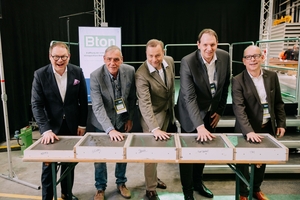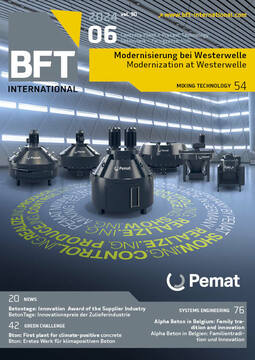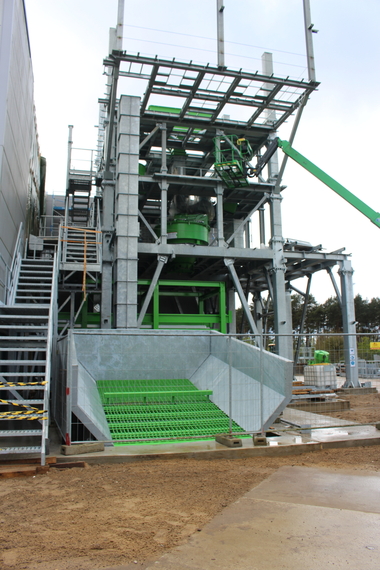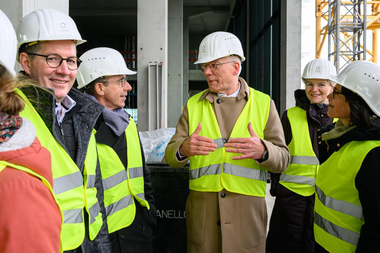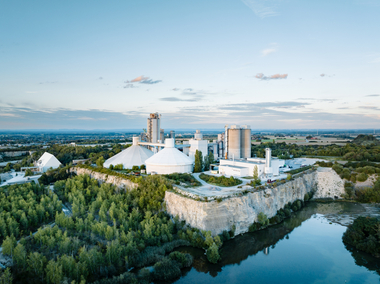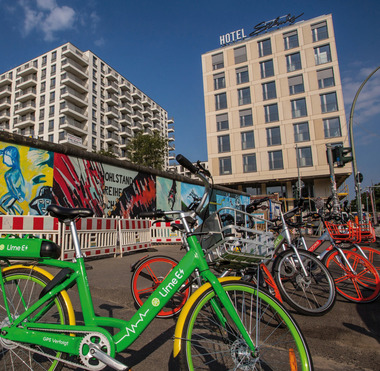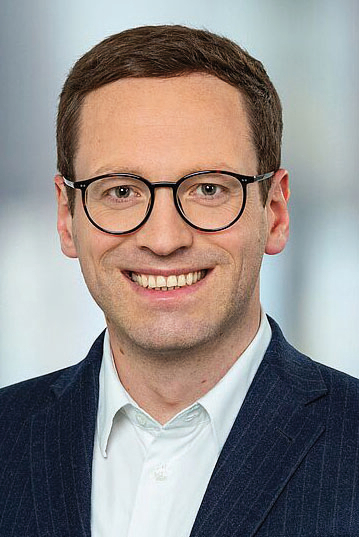First plant for climate-positive concrete opens in Germany
Lighter, more ecological, exceedingly versatile, and cost-effective: Bton Fertigteilwerk GmbH has completely rethought the most important material in the construction industry. This innovative concrete is now being produced in Soltau, opening new avenues in residential construction. A detailed report on the new equipment and machinery used at the plant will be published in a later BFT issue.
Responding to the housing crisis is critical to the future of our society. Groundbreaking innovations are needed to provide people in Germany with affordable, adequate, and sustainable housing in the future. Bton was founded in 2021 by the Sievers family, Antonio Catarino, and Thomas Demmel, and succeeded in developing the construction material of the future whose production is currently being ramped up for the German market. Together with its network partner “80 Seconds – New Building”, Bton Fertigteilwerk GmbH recently opened the first state-of-the-art plant for environmentally optimized, climate-positive concrete in Soltau in the German State of Lower Saxony, which is an important milestone towards the future of sustainable, decarbonized construction in Germany.
“Congratulations on achieving this milestone! The processes you have put in place here are impressive. We are counting on you to support Europe on its way to climate neutrality with your solutions,” emphasized Lena Düpont, Member of the European Parliament, in her opening speech. More than 9 million euros have been invested in the Soltau project. Of this amount, 1.25 million euros were funded from the European Regional Development Fund (ERDF) as a project-specific investment grant.
The Soltau factory uses an innovative, patented hybrid mixing technology to produce precast elements such as façade, wall, and ceiling panels for residential construction in conformity with DIN standards. Being the first-ever application of this technology in a precast plant, it allows for not just reducing carbon emissions, but incorporating even more carbon into the concrete than was emitted in total thanks to specially developed mixes. The recipes and technologies developed by Thomas Sievers combine innovative, patented techniques for treating input materials, mixing the concrete, and curing the precast elements using state-of-the-art digital manufacturing workflows to enhance the performance characteristics of the concrete and to make production processes more efficient. All types of concrete – standard concrete, lightweight concrete, UHPC, and cement-free geopolymer concrete – can be produced in an automated, environmentally optimized, carbon-negative manner at low cost and processed into high-quality precast elements. The large-format components manufactured in this process are designed for serial construction, which significantly accelerates the provision of housing space.
For the most part, the production equipment was procured from engineering companies Avermann based in Osnabrück, who provided the pallet carousel line, and MCT Italy based in Perugia, who supplied the mixing tower. Additional suppliers included Ratec, Curetec, and Unitechnik. A detailed report on this new equipment and machinery will be published in a later BFT issue.
Sustainable, climate-positive concrete production
Conventional concrete is a global carbon emission driver accounting for approximately eight percent of global emissions, due to cement production alone. This is where Bton uses its ability to innovate to minimize carbon emissions in the production and use of concrete.
Its hybrid mixing technology allows for producing particularly environmentally friendly types of concrete, which can reduce carbon emissions by up to 80% in the first step compared to previously established processes. In a second step, carbon-reducing materials (such as biochar) are added. Such climate-positive concretes absorb more carbon than is emitted by their manufacture, particularly in cement production. Using structurally effective fibers partially or completely substituting steel rebar also lowers the amount of carbon embodied in the concrete – a crucial step towards a sustainable construction industry and the protection of our ecosystem.
The new concrete also delivers solutions to other problems: For example, conventional concrete is very heavy; in some cases, up to 40% of the structural components are built just to support its own mass. Bton’s new concrete is much lighter while providing the same strength and thus increasing resource efficiency. This innovative concrete also offers improved thermal insulation, which enhances the energy efficiency of new buildings significantly while also reducing heating costs.
It thus contributes to reaching the net-zero goal, where buildings or the construction process produce no net greenhouse gas emissions anymore. Bton reduces the environmental footprint of buildings, making it an important player in the decarbonization of the construction industry and the fight against climate change.
Although the “new” concrete comes with these immense benefits, neither the production process nor its subsequent use in construction becomes more expensive. Components are offered at market prices and are fully compliant with applicable codes and standards. More specifically, they adhere to relevant EU standards and generally accepted industry standards in terms of quality, safety, and performance.
Patented hybrid mixing technology
In the future, the Bton precast plant will use only green electricity generated by photovoltaic and solar thermal systems, which will soon be installed on the entire building. In the climate chamber, which accelerates the curing of precast elements, heat is generated climate-neutrally by means of a heat pump. The proprietary hybrid mixing technology saves energy and water compared to conventional methods, which comes on top of the carbon savings achieved by the new concrete design.
Bton managing director, Antonio Catarino, comments: “We’ve been working towards this day for ten years and are immensely proud of what we have achieved. Now we have the technology in place to make a significant contribution to decarbonizing the construction industry. In a few weeks, we will reach a daily output of about 500 m² and later even 1,000 m² of precast elements. And we also supply ready-mix concrete to construction sites located nearby.”
Thomas Sievers, the second managing director of Bton, adds: “Our plant is so exceptional simply because we have developed a technology that, in times of increasingly scarce resources, even allows us to use desert sand, which has previously been unsuitable for concrete production, as an aggregate on a large scale. Also, compared to conventional standard concrete with +270 kg CO2eq/m³, our concrete achieves -30 kg CO2eq/m³, i.e. a climate-positive footprint, while retaining the same compressive strength of 45 MPa.”
Strengthening Germany as a place to do business with an international perspective
Lower Saxony’s Minister of the Environment, Christian Meyer, Member of the State Parliament, said at the factory’s opening ceremony: “I am delighted that Bton GmbH is taking on a pioneering role in the construction industry in Soltau. Climate-friendly, low-carbon cement is an extremely important cornerstone on which we can build to achieve our climate goals.”
In congratulating the Bton team, Sandra Weeser, Member of the German Bundestag and Chair of its Construction Committee, stressed the significance of this innovation: “Climate-positive concrete is not just a technological innovation, but also an opportunity for a green transformation in construction. The challenges in new construction as well as in the renovation of existing buildings, are enormous. It is only through such innovations and, more specifically, the initiative of small and medium-sized businesses that we can achieve the turnaround in construction and meet the ambitious climate targets for the construction sector.”
The Bton technology installed in Soltau will be marketed from this location on a national and international scale to enable local production using systems based on the model of the Soltau plant. For this reason alone, the new factory is not designed as a pure production facility. Instead, it will also serve as a center of research, development, and training of national and international specialists. This includes the technology itself as well as the required concrete technology and application expertise and existing and future intellectual property rights. Bton has submitted groundbreaking concrete recipes for a national technical approval that are significantly lower than the current minimum water/cement ratios, thus taking a further step towards decarbonizing the concrete industry. Not only does Bton GmbH take responsibility for education and training; the company also demonstrates its commitment to thinking along the entire design, production, and construction process in the residential sector to avoid friction and coordinate all stakeholders in the best possible way.
“Bton makes a major contribution to ensuring that we make faster and more sustainable progress in housing. If we really want to build 400,000 affordable homes a year, one every 80 seconds, we need innovations like these. ‘80 Seconds – New Building’ is the network of the ‘movers and shakers’ in the construction and real estate industry. We are proud to provide a platform for Bton. This allows real progress to reach the market faster,” says Robert Kroth, Managing Director of “80 Seconds – New Building.”
US architect, designer and author William McDonough, a pioneer in sustainable building known for his cradle-to-cradle approach, was also among the enthusiastic well-wishers at the opening ceremony: “Congratulations on the opening of this plant! Climate-positive concrete? That’s absolutely incredible! I hope that you will all support this idea so that this construction material becomes a vital, successful product generating broad and lasting acceptance. Thank you to the Bton team for this innovation from all of us in the construction world.”
Part of the “80 Seconds – New Building” network
The Bton team is already planning the next steps: “We are excited to finally bring this innovative material to a wider market and help solve some of the most pressing issues in the construction industry. At the same time, we are planning to open ten additional gigafactories within the next three years, and we’re also adopting an international mindset. Wherever we present our concept, politicians, residential real estate, and industry welcome us with open arms,” says Thomas Demmel, Bton managing director.
The strategic choice of Soltau providing a central location with excellent transport links to the metropolitan regions of Hamburg, Hanover, and Bremen reflects Bton’s ambition to make a measurable contribution to the regional and national economy. In addition, the company’s commitment to the environment and the local community matches the goals and visions of the city of Soltau. Bton GmbH will create approximately 50 new jobs in Soltau.
Bton Fertigteilwerk GmbH is part of the network “80 Seconds – New Building”, the driving force for the construction and real estate industry.
CONTACT
Bton Fertigteilwerk GmbH
Gottlieb-Daimler-Str. 5
29614 Soltau/Germany
+49 5191 96978-0

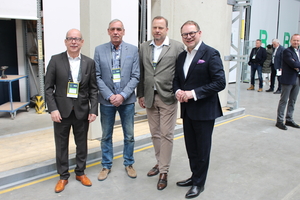
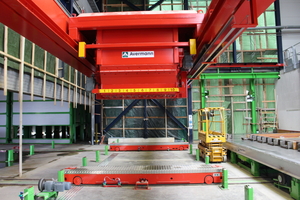
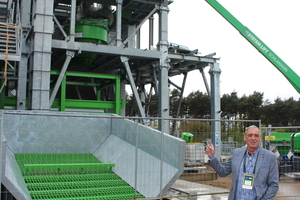
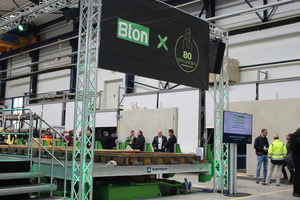
![Managing director Thomas Demmel explained the company name: The missing ‘e’ in Bton [concrete] stands for zero emissions](https://www.bft-international.com/imgs/2/0/9/9/7/8/1/tok_64ddad6a546337d88597e1e33d30c60c/w300_h200_x600_y400_HA_1248_Fig.5_IMG_3247.JPG-8403b599c2208370.jpeg)
